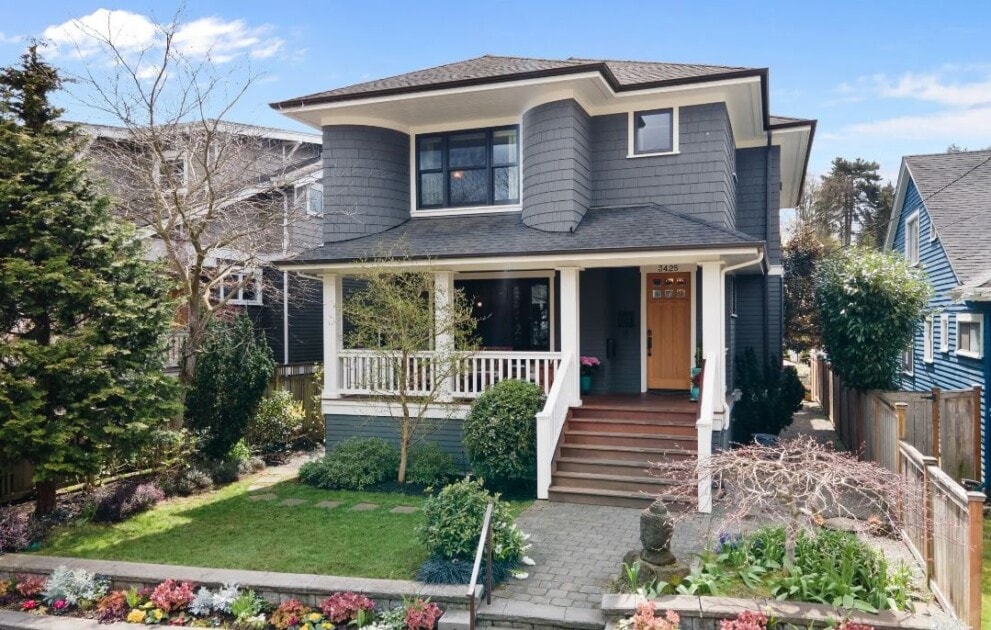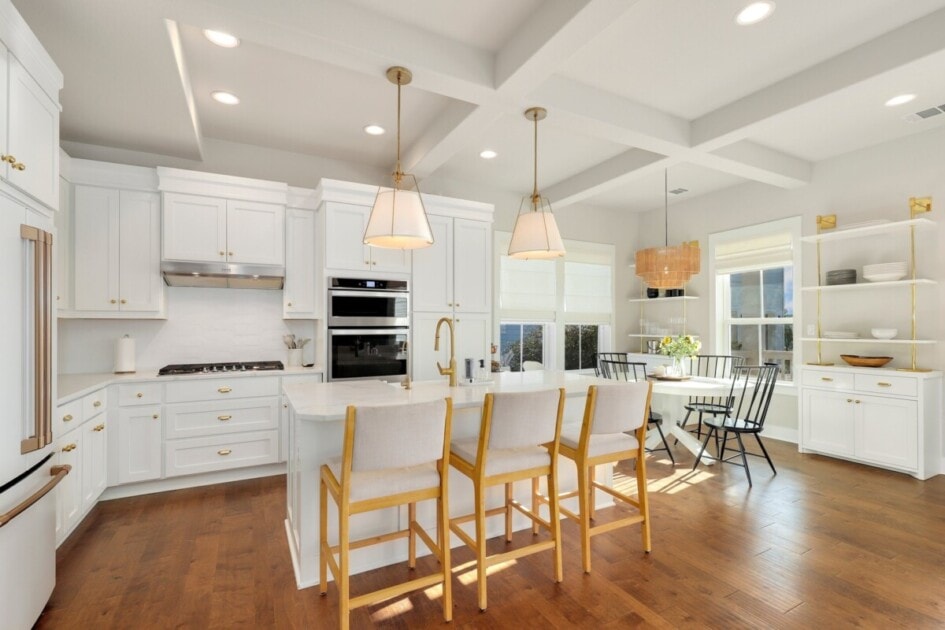Should I Lock in My Mortgage Rate Today?

Mortgage interest rates are always changing – moving up and down each day, even each hour. These quick changes can impact the amount you pay when you refinance or close on your mortgage. As long as your closing isn’t delayed past the deadline, locking in your mortgage guarantees that the rate you’re given for your loan will stay the same until closing, regardless of what happens with the market. However, locking in your mortgage rate does come with some risk.
In this article, we will examine why mortgage rates change, how locking in your mortgage works, and if you should lock in your mortgage rate today.

What does it mean to lock in my interest rate?
When you shop for a mortgage, the lender will prepare a “mortgage loan offer,” which will detail the proposed loan rate, the loan term, and monthly payment amount if the loan is approved. When you receive this offer, the lender will ask if you want to “lock in” your interest rate. If you choose to lock in your rate, it will be guaranteed – or locked in – for a specific time frame, usually through your anticipated closing date.
Lenders offer rate locks to borrowers because interest rates often fluctuate between when you first submit your loan application and finally close on your home, often many weeks later. If you lock the rate and market interest rates increase, you still get to keep your lower rate. But you could lose out if you lock a rate and interest rates fall — unless your lender offers a “float down” option.
Why do mortgage rates change?
The market influences mortgage interest rates. Let’s take a look at which specific market factors initiate these changes.
Supply and demand
Mortgage rates move in response to supply and demand. If homes are flying off the market, interest rates tend to increase. If the housing market slows down, rates decrease as lenders attempt to stimulate demand.
Economic changes
Interest rates tend to increase when the economy is doing well. If the economy slows, interest rates typically also drop, again, to stimulate spending.
Federal funds rate
All lenders determine their rates based on the “federal funds rate,” which is the rate at which lenders can borrow money. The Federal Reserve manages the federal funds rate in response to different economic indicators (such as rates of inflation and employment) as part of its mandate to maintain the stability of the nation’s financial system.
Mortgage-backed securities
Lenders often bundle their mortgages with other loans and sell them to investors as mortgage-backed securities. Changes to the price of these securities can change the interest rate on your mortgage.
Your credit score
This is the only factor influencing the interest rate that you can control, unless you buy-down your interest rate. An improved credit score – and cleaning up any errors on your credit history – will position you to get a better interest rate. If you have a few items to clean up on your credit, ask your lender for some advice on which ones will help improve your score the most.
How does locking in my mortgage rate work?
A rate lock freezes the proposed rate for an agreed-upon amount of time, typically 30 to 60 days. Let’s look at three different mortgage rate scenarios to see how locking in your mortgage rate can play out.
If rates go up
As we’ve mentioned, mortgage rates can fluctuate, and if you’ve watched the housing market over the past few years, you’ve seen changes almost daily. These changes may seem small, but even an increase of .5% can cost you a lot of money over the loan term. For example, on a $300,000, 30-year fixed-rate loan, the payment goes up by almost $80 per month if the rate goes from 5% to 5.5%. The result? The borrower will pay nearly $30,000 more in interest over the loan term.
So in this example, if you’ve locked your loan in at 5% and the interest rate changes to 5.5% before you’ve closed on your home, your interest rate will remain at 5% and you’ll avoid paying $30,000 in interest over the loan term.
If rates stay the same
Sometimes, you might lock in your mortgage rates, and from there, rates increase and decrease, finally settling down at closing in exactly the same place you locked in at. Keep in mind that a rate lock intends to protect you from an interest rate increase, so even if nothing changes, you have peace of mind through the process.
If rates go down
If rates decrease before you close your home purchase, you’ll miss out on the lower rate – which is clearly not ideal. This is unless your lender provides a “float down” option on your rate lock.

Float-down option: an alternative to locking in your rate
If your rate is locked in and rates go down, a mortgage rate “float-down” makes it possible to capture a lower interest rate for your loan before closing the home purchase. Ask your lender about the float-down option before you lock in your rate, as well as any extra fees charged to include a rate float-down.
Each lender has specific policies about rate locks, float-downs, potential fees, and when they can be applied. Some lenders may require that interest rates drop by a specific amount before you make a change and may charge a fee to move to the new rate. If you have more than a month before closing, the float-down option can be a good idea. The application process is straightforward, especially if you have a credit score above 640 and a clean credit history.
Pros and cons of locking in your mortgage rate today
Pros of a mortgage rate lock
Locking in your mortgage rate today may be appealing because:
- Interest rates may increase after you lock in your rate: If you like the offered rate, locking in your rate means you don’t have to worry about the rate rising during the weeks or months between getting your loan estimate and closing on the mortgage.
- Peace of mind: A higher interest rate can increase your monthly payments significantly, pushing that affordable mortgage right out of your reach. If you lock in a mortgage rate today, you won’t need to worry about rising interest rates that would change the price of your mortgage.
Cons of a mortgage rate lock
However, locking in your mortgage rate immediately does come with some risk, including:
- Interest rates may fall after you lock-in: If interest rates drop, and you have locked in your interest rate, you are still stuck with the higher rate.
- Letting the rate lock expire may cost you: Rate locks for 30 days or less are usually free. Some lenders extend free locks for 45 days or more. But after that, the lender may charge a fee to lock the rate. The longer a rate is locked, you can expect incrementally higher fees. These rates often rise in tandem with each 30-day increase in the lock-in period.
How long does a rate lock last?
Mortgage interest rate locks typically range from 30 to 60 days. It would be best to find out how long it takes your lender to navigate the closing process on average in your area. If your lender has a backlog of applications that might cause a delay, ask to extend the deadline for your rate lock as long as possible.
You can help your mortgage application process along by being ready to provide your lender with all necessary documents, which include:
- Photo ID
- 2-years of income tax returns
- W2 from an employer for proof of income
- Bank account statements
If delays on your end cause the rate lock to expire, the lender may charge you a rate lock extension fee, while some lenders may split an extension fee. If the lender is the source of the delay, they will likely pay the extension fee.
How much does it cost to lock in your interest rate?
As mentioned above, it’s common for lenders to offer free 30-day rate locks while some lenders extend free locks for 45 days or more. After that, the longer your rate is locked the more it will cost. So make sure to ask your lender about their fee for a rate lock. Keep in mind that the costs of locking in your rate will likely be recovered in savings over the loan’s lifetime if rates increase.
When is the best time to lock in a rate?
1) When rates are on the rise: Start by researching the current trends for mortgage rates. If they’ve been increasing, it could be wise to lock in now.
2) When the Federal Reserve is set to meet: The Federal Reserve board meets quarterly to assess the economy and consider the need to adjust the federal funds rate. If the Fed discusses a rate increase, usually in response to cooling inflation or slowing down a fast growing economy, Market interest rates tend to increase.
3) When your budget is tight: Locking in your interest rate will allow you to set your budget and give you a clearer sense of your monthly mortgage payment.
4) When closing is set: If your closing date is mutually agreed to and you’re offered a competitive interest rate, it would be wise to lock in your rate. If your closing date is flexible or you’re uncertain about how delays will affect it, locking in a rate may not be worth it since you may have to pay for an extension.

Can I unlock a mortgage rate if interest rates drop?
If you’ve already locked in your loan and the interest rate falls, some lenders offer a float-down option that will allow you to switch to the new, lower interest rate. However, you may pay an extra fee for this.
If rates have been trending down and your lender doesn’t offer a float-down, you could withdraw your previous application and reapply for a new loan. You need to consider this carefully because you may have to pay for a new appraisal, credit check, and new application processing. It may also add time to the lending process, and require agreement from the seller of the property if you’ve already gone “mutual” on a house.
If a new application causes a delay to your closing, you’ll want to consider its effect on the seller’s time frame and (potentially) your living arrangements. If the rate decreases, it will allow you to save thousands of dollars over time. A few hundred dollars in fees upfront may be well worth it as long as it doesn’t cause you to breach your contract.
What happens if my rate lock expires before closing?
If your rate lock expires before closing, your rate will align with the daily interest rate movement. When you lock in your rate, talk to your lender about their rate extension process so you stay well ahead of this deadline and understand their policy about lock extensions and any associated fees. If you have not caused delays by failing to provide the information they need, they may be more lenient and give you extra time without charging you for an extension.
Should I lock my mortgage rate today?
Every homebuyer has a unique financial situation, and there is no one perfect time to lock in a mortgage interest rate. However, if you have applied for a mortgage and are comfortable with all of your lender’s mortgage offer terms, it could be a wise move to lock in your rate. Do a little research and ask your lender about current rate trends. Your lender would like to work with you, so if the interest rate picture is muddy for you, ask for some help to clarify market conditions. Much like trying to forecast a stock price, mortgage interest rates are unpredictable. The only way to be sure to get a rate you want is to lock it in.
The post Should I Lock in My Mortgage Rate Today? appeared first on Redfin | Real Estate Tips for Home Buying, Selling & More.
from Redfin | Real Estate Tips for Home Buying, Selling & More https://www.redfin.com/blog/should-i-lock-my-mortgage-rate-today/
Nhận xét
Đăng nhận xét